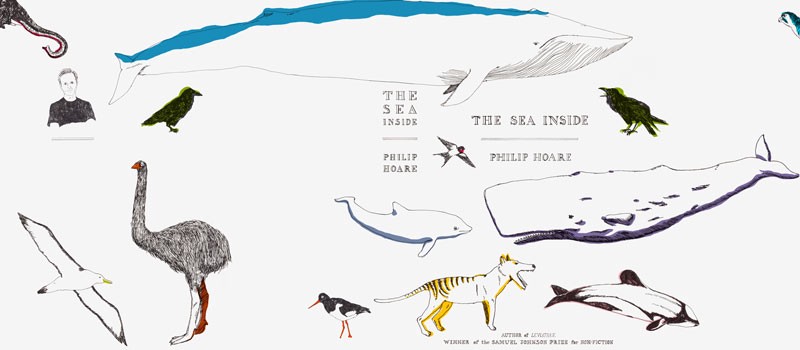Craft
Dispatches from the Road: Made to Break Vancouver

February 26th marked the inauguration of D. Foy’s national book tour in support of his debut novel, Made to Break, released from Two Dollar Radio on March 18th. Here is the second installment of his tour blog.
3/2
This was the first day of my sweep through the Pacific Northwest with Cari Luna, author of the killerdiller novel, The Revolution of Every Day. My publisher, Eric, had hooked us up for my event at Powell’s, but because she’d received invitations to read in Bellingham and Olympia (Washington), we took advantage of the opportunity to plan a sort of Bonnie-and-Clyde on the Northwest. By the time we booked a date in Vancouver, as well, where I’d had a fantasy of reading, probably for nostalgic reasons (I’d been there years ago as a kid), we had ourselves a five-city tour lined up, under the auspices of #LunaAndFoy.
All-things AWP far surpassed my expectations. I probably had more fun in the last four days than at any conference-type affair, ever. The flipside of this? I was due for trouble, or rather at least for trouble’s little brother. And sure enough, the rat chose the morning Cari and I were set to leave Seattle to waylay me.
According to plan, having flown out to Seattle, I was now ready to pick up the rental car I’d reserved back in December for the West coast leg of my tour — Vancouver to LA. But when I called Advantage rental car that morning to check its pickup address, I was greeted by the computer lady that answers when phone numbers are disconnected. I called the 800-number for Advantage to receive confirmation from a human in the Philippines or India that in fact Advantage no longer existed in Seattle and that Thrifty car rental had assumed responsibility for its obligation to me. But when I called Thrifty, they had no record of my reservation. The same human from the Philippines or India, or so it seemed — the human not only spoke English very badly but couldn’t seem to understand it, either, repeatedly parroting as they did gibberish that had nothing to do with my questions — told me I needed to call Advantage again to get another confirmation code that corresponded to a code recognized by the Thrifty system. This went on and on, back and forth and all around, until two and a half hours later it struck me
I’d somehow become the object of the sort of cosmic hoax with which our old friend Mr J. Kafka was so familiar
. Nothing could be done, or so I was informed by a different, purportedly superior human: it was now incumbent upon me — me! — to rent another car on my own. I checked the email account I use for buying things online — essentially my spam account — and found that just yesterday Advantage had sent a letter informing me, like the humans on the phone, that they were no longer responsible for my reservation. The letter also included a new confirmation code that, doubtless, was still unrecognizable by any of the aforementioned systems.
This is as good a place as any to speak a bit of politicalese: the human from India or the Philippines was not a nameless humanoid but, very obviously, a thinking, feeling person. The system these people work for has dehumanized them in the name of profit. I don’t know for a fact that they were speaking from India or the Philippines, but assume so by virtue of precedent. Every customer service operation for every major business, it seems, nowadays bases its operations in India or the Philippines. Why? Because capitalism seeks out the cheapest labor it can find, whether by machine or man, though preferably by machine, reducing man meantime — when it can’t resort to machine — to machine. The most profitable market for exploiting humans, as far as my experience can tell, is India and the Philippines, though surely that market will shift the instant the people it depends on for profit become intractable to that end. But no matter where that market is, one factor will stay constant: even as the service worker is mistreated, the consumer, as was the case for me that morning, and as has many times been the case, will always bear the brunt of systemic greed.
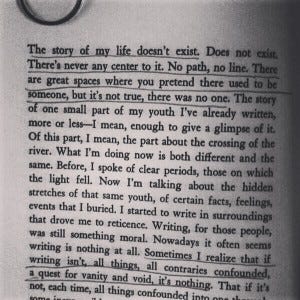
To continue, however, and to wit: in the lobby of the Grand Hyatt, where Cari had been waiting all this time (reading Duras as she did), she confirmed that despite my trauma I still possessed enough of my faculties to continue on. We would go to the Dollar agency at the airport with my new letter as though none of what had just happened happened.
At the airport, with an actual and actually kind woman, I went through more of what I’d experienced on the phone until the person the kind woman called on her phone said that my reservation would likely have been assumed by Hertz, which, as it turns out, owns both Thrifty and Dollar. This was true. My confirmation number agreed with the Hertz system. Hertz gave me my car, at last, and only charged me $500 more, in insurance fees, despite my existing coverage for my car back home, which protects any car I drive. The fees for Hertz would cover the cost of the daily rental fee for every day the car would be out of commission in a shop, should I get in an accident, they said. Later I was informed that the person at Hertz had lied about the insurance fees, and that the employees of car rental agencies employ this dastardliness all the time. Wha???
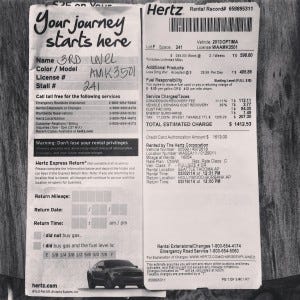
That night, in freezing, slushy Bellingham, Cari and I read to three people, one of whom was Dave, the accommodating and very pleasant events coordinator. We hadn’t considered AWP burnout, much less that it would doubtless apply to the people of letters who lived in Bellingham, most of whom would likely have been at AWP. Worse, and I think far more foolishly, we had overlooked a key fact — that this date coincided with Oscars night. I mean, right? Forget known writers, or even writers who are bona fide famous. What unknown writer in her working mind will think she can compete with the Oscars? Despite these obstacles, however, the reading and discussion came off fantastically. Village Books recorded the whole thing for play on two radio stations later in the month. No one in that audience will have any idea that the show wasn’t packed!
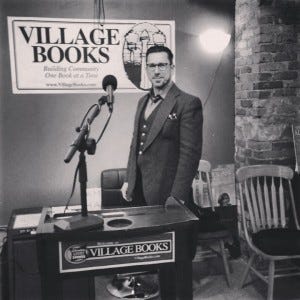
Later I slept in a hotel room that, did I believe in ghosts, I’d have said was haunted. But I don’t believe in ghosts but in moribund energy — the remnants, that is, of bad shit having gone down. I’m a bit of a psychic — the examples of this minor power are too many and long to say here — and am sensitive to the extreme of the mojo in a place. And the mojo in my room was anything but nice. I woke up at least six times during the night, and when I got up for good, way too early, I felt as though I were covered with mold. By the time Cari and I had nabbed some provisions for the road in the local co-op grocery, the mold was gone and the town was a blur.

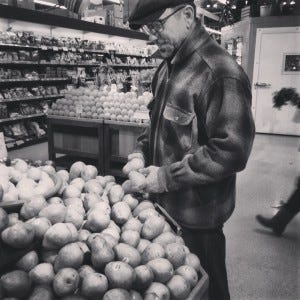
3/4
Cari and I appeared at a well-attended reading at Pulpfiction Books in Vancouver the night before, courtesy of its magnanimous and considerably educated owner, Chris Brayshaw, and Sean Cranberry, local literary impresario and host of Books on the Radio. A young woman in the audience hadn’t read (or even heard of) Cari until that night, but Cari’s reading so affected her that she bought Cari’s book straightaway, saying, almost in tears, how much she identified with the young woman in Cari’s passage. Needless to say, that was all Cari needed to hang out on Cloud 9 for the next day or two.
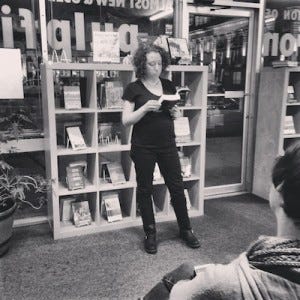
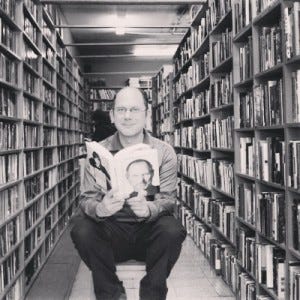
I was happy for Cari in this alone, but I was happier for her still when we hit Orca Books in the dump that is the town of Olympia, Washington. This was after a five-hour drive during which we passed through the rainy farmland south of Vancouver, its trees filled — and I mean filled — with colonies of roosting vultures. “@dfoyble and I have arrived in Vancouver,” Cari tweeted. “The trees outside the city were full of vultures! This made me deeply, inexplicably happy.”
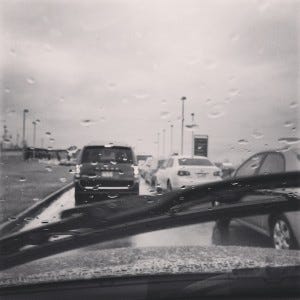
At a rest stop just inside the States again, I was as happy to find a pair of old school phone booths as Cari was to see her buzzards. “Won’t be seeing these for much longer. #relics,” I posted on Facebook.
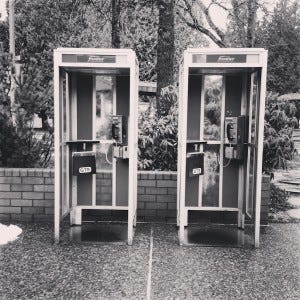
As for Olympia, its ugly face should’ve been portent enough for things to come. From barren hinterland straight through to city center, this place stunk of oppression and despair, like some creepy hamlet in a dark ages film, wasted by plague or sacked in war. The denizens were scarcely evolved from punk rock derelicts — as far from the cool punk kids that galvanized the world a few decades back as a ghetto cur is from a blue-ribbon pit bull. We were hungry. A Yelp review that rated 94% directed us to a banh mi joint that with its filth and gloom wouldn’t last a day in NYC. It so appalled Cari, she refused to eat its food. When at last we pulled into Orca after working a few hours in a nearby café, we were “greeted” by John Muir’s great great grandson, then told by his cohort that my books were not in-store. “Your distributor had a problem,” she said with an icy smirk, and turned away to ask another cohort whether that was the case. It was the case. But did I receive an apology, or what could pass for an apology? Did I receive any acknowledgement that I’d traveled thousands of miles to attend this reading? Did I receive even the basest courtesy? I did not. Not the tiniest least.
This is where Cari’s status as a visitor on Cloud 9 came in handy.
She rubbed my shoulder and patted my head and talked all nice and special. In short, she was a real friend, a perfect doll, a lady. The fun, however, was far from over. Come reading time, the people who ran the store refused to introduce us. Two of them slunk off to a stock room while John Muir’s descendant sat with his back to us, hunched before his crappy PC. Fortunately, despite the ineptitude of this “business” (it pains me in extremis to see independent booksellers comporting themselves so shoddily) thanks to friends and Twitter — Cari knows people who know good people in Olympia — our reading was well-attended. One of the audience, in fact, was already an actual fan of Cari’s. He loved her book so much, he told her while she glowed, that, as is his wont when reading fiction, he found a companion non-fiction book with which to pair hers — Rats: Observations on the History and Habitat of the City’s Most Unwanted Inhabitants. What could be more perfect for a book about squatters in NYC’s Lower East Side in the ’90s? We left the store as we’d entered, without a word from its employees, and in a flash I understood with disturbing intimacy Kurt Cobain and why he used a shotgun to take his life. Misery may be a dynamo for great art, but more often it’s the dynamo for the stuff of endings like his. If only we talked about that part half as much.





